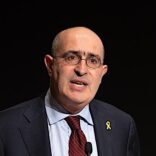Amidst the troubling data regarding international anti-Semitism in a major survey released by the Anti-Defamation League were some less commented upon figures that should give us all pause for thought.
Of the people surveyed, less than half of those under 35 had heard of the Holocaust. Of those that had heard of the Holocaust, 39 percent of respondents age 18-34 said that they believe that the Holocaust was a myth or that the number of Jews who died was greatly exaggerated (compared to 19 percent of those age 65 and older who felt the same way).
There is a paradigm shift going on and we need to be aware of it.
While there are geographic variations, in general a younger generation of people in the world is growing up that knows or cares little about the Holocaust.
The issue is not just what the perceptions are today but more importantly what they will be in the future. What will those figures look like in 10 years time? Will we see, in our lifetimes, the Holocaust turn into a dim memory in world consciousness kept alive by an ever-shrinking group of determined individuals?
The question is whether we can find tools to educate a younger generation that is already disconnected from this critical event in world history, keeping in mind that they will grow up in a world with no living witnesses to the Holocaust. Despite the valiant work of many organizations, the challenge is huge.
In recent weeks, a fierce battle over the history of the Holocaust has been waged in Eastern Europe. The Jewish community in Hungary is strongly and publicly opposing the erection by the Hungarian government of a historical monument in Freedom Square in Budapest. The community believes that the statue — depicting an eagle attacking an angel — absolves the pro-Nazi Hungarian governments of their role in the massacre of half a million Jews in Hungary. Despite intense local pressure, the community announced that it would not participate in the unveiling ceremony for the monument.
The fight is not over a statue but over history. Surrendering the historical narrative is to lose a part of ourselves. To do this in a place where, according to the survey, more than 40 percent of the population hold anti-Semitic attitudes is a mark of tremendous leadership and courage by those community leaders.
The conflict over the historical narrative regarding the Holocaust finds a parallel in the struggle over the current depiction of Israel among the younger generation in Europe.
This year, votes supporting boycotts of Israel were passed by students at the University of Dundee in Scotland, Galway University in Ireland and King’s College London.
A survey carried out by a European research institute a few years ago in eight major Western and Eastern European countries found 40 percent of respondents agreeing with the statement that "Israel is conducting a war of extermination against the Palestinians."
There are places, where the debate, especially among young people in Europe, has moved from being whether Israel's policies are fair or not, to being about whether Israel should be treated as a pariah state or not.
Israel is no longer regarded as a unique country that was created for a dispossessed people coming out of the trauma of genocide. Rather a significant part of the youth of today is growing up in Europe and countries around the world perceiving Israel as an oppressor state.
In most countries in Europe, the national political leadership is largely supportive of Israel and sensitive to Jewish issues. But will a new generation of leaders who have grown up hearing a very different public discourse about the history and role of Israel and the Jewish people than did their parent's generation be of a similar disposition?
Maybe those bleak numbers, events and perceptions are just a snapshot and not the full movie. The more optimistic view is that as the younger members of society age, their views will mellow and soften. But perhaps we are, instead, witnessing the beginning of a generational change in attitudes to the Holocaust and Israel.
What we say today about the history of the Holocaust and of Israel will determine the world's understanding of Jews and Israel tomorrow. Understanding history is not a guarantee of broad mindedness but ignorance will for sure lead to prejudice and hostility.
To stand out against the tide is not easy. Tremendously able, committed and passionate people — both Jews and non-Jews — can be found across the world bravely describing a history and articulating a narrative that is often at odds with what has become the accepted wisdom among young people today. It is a task in which we all share responsibility.
Gideon Taylor is a former executive of the Claims Conference. Today he works in the private sector.
The New York Jewish Week brings you the stories behind the headlines, keeping you connected to Jewish life in New York. Help sustain the reporting you trust by donating today.





